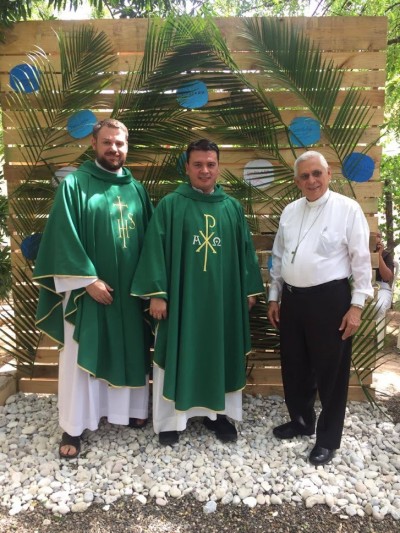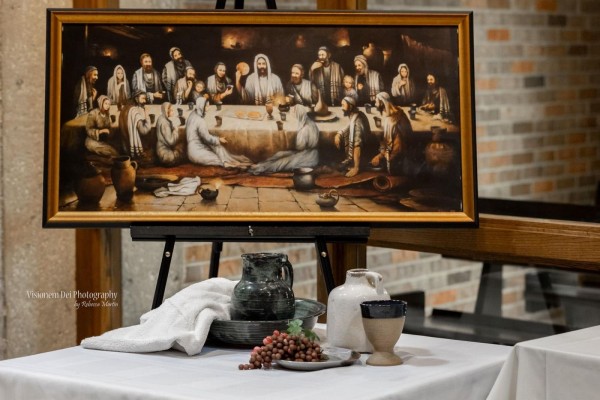
On Holy Thursday, we traditionally celebrate the Passover, the institution of the Eucharist, and the institution of the priesthood. The Holy Scriptures we read for this celebration invite us to reflect on these mysteries. The book of Exodus narrates the Passover when the people of Israel prepared for their journey out of slavery. That crucial moment right before they set out on the road to the promised land. A dream come true: freedom. The promised land for the people of Israel is freedom and abundance. God heard the cry of his people’s suffering. God, in his deep love for his people, did something unexpected: he found an ally, Moses, and faced the power of Pharaoh to free his people—a gesture of love and commitment to his covenant with his people. For us Christians of the 21st century, this holy night should help us reflect on the use of our freedom and the abundance that some of us enjoy and millions of people do not have. How can I, from my little corner of the world, push for the Lord’s dream and promise of a land of freedom and abundance for all to come true? Am I willing to partner with God to fight against the world’s injustices out of love for others?
Saint Paul’s letter to the Corinthians tells us the words of the Last Supper that Jesus shared with his followers. In that intimate moment of sharing, Jesus gives himself to us as food for the journey of life. In that gesture of love, Jesus leaves us, his disciples, a sign of total dedication so that we remember him every time we share the Eucharist. In a world where many fears and misinformation abound in social media, the Lord’s example reminds us to value the gift of self without fear and sincerity.
But the most unexpected thing about the celebration of Holy Thursday is the gospel we read. Every Holy Thursday, we are reminded that the Lord, while at the table with his disciples, put on a towel and began to wash his disciples’ feet. This was unexpected for his disciples, who had just experienced the triumphal entry into Jerusalem. They were acclaimed by those who awaited the “triumphant messiah.” Suddenly, in an unplanned moment, Jesus begins to wash the feet of each one of them. Judas, who betrayed him and sold him for 30 coins. Peter, who denied him when things became difficult. Thomas, who struggled to believe in the promise of the Resurrection. John and James, who wanted a place of power and honor. To all of them, one by one, Jesus washed their feet and showed them a love that overcomes all their flaws. His love for them is greater than their pettiness. As Jesus washes his disciples’ feet, he teaches that love in its purest form is service.
The unexpected actions of Jesus’ love for his disciples urge us to dream of a new world with freedom and abundance for all, not just for the few. Jesus’ unexpected self-gift in the Eucharist invites us to make our Christian lives a gift in service to our brothers and sisters. The humble and simple gesture of the teacher invites us to understand that authentic leadership is done in service. For followers of Jesus, the Eucharist discovers its most profound meaning when our lives are spent in service and dedication to others.
Several Parishes from Racine, Wisconsin, run by priests of the Community of Saint Paul, carried out in June a Summer Service Project to help those most in need in the city.
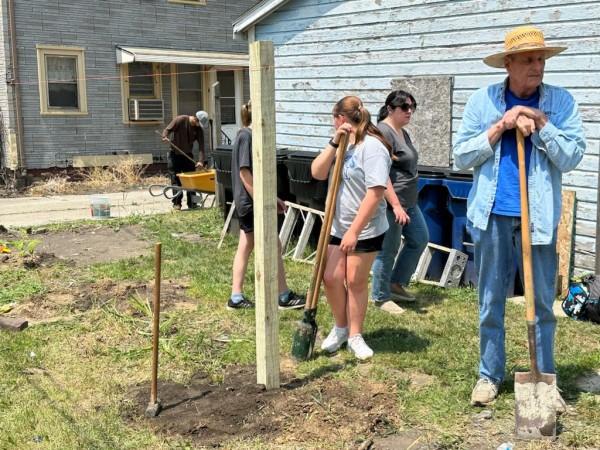
After the pandemic’s toughest year (2020), in June 2021 we decided to create a service program that would help our youth give back to our community. We also wanted the adults in the parishes with skills to teach the younger generations. The idea was to bring the energy of the youth and the wisdom of the mature people together to serve others. We established a partnership with a local institution (Neighborhood Watch) to revitalize homes in neighborhoods of the inner city of Racine. The local partner does the groundwork: selecting families and securing the permits and the materials for the project. We, the Catholic Community in Central Racine, coordinate the efforts to get youth volunteers and adults who can work for a week on the projects.
It is with great excitement that I write this note about our third Belle City Catholic Summer Service Camp. Of course, I am always excited about life, but this time around I am elated. Our Summer Service Camp was a great success. Last month we came together for a week of hard work. We logged 1,521 hours of service to our neighbors on Mead Street. We built fences, painted houses, rebuilt a shed, cleaned the park, and spent time in prayer and fellowship. I am so proud of this Service Camp. Two years ago, when we came up with the idea to work locally, I envisioned an event that would bring us together: Catholics working together for the betterment of the city. We continue to move towards that goal as more people and parishes get involved. I am already looking forward to the next year’s Summer Service Camp!

Several years ago, during a funeral in the streets of Sabana Yegua (Dominican Republic), the daughter of the deceased confronted me during my homily with the following words: “I am scared for my dad. Do you really believe this?” I should say that during the homily I was trying to comfort the family by sharing with them the essence of our faith: the Resurrection. I was telling them that by faith we believe that Jesus, after his death, rose and, in his Resurrection, destroyed death and gave us eternal life. All of us who are baptized in Christ enjoy this Grace. On that sunny day I was faced for the first time in my life with the question: why do I believe in the Resurrection?
To answer this question, we must start by reflecting and exploring the feelings that the group of disciples experienced after Jesus’ tragic death on the Cross. The Cross was a devastating event that shattered the hopes of those who walked with Jesus as disciples. Jesus’ detention scattered the disciples (Mt 26, 56). The hours after the Crucifixion must have been agonizing, with the disciples not knowing what was going to happen to them, not knowing what could be done, not knowing what to think. The time before the Resurrection was one of fear and anguish, with no certainty that Jesus’ promise would be fulfilled. Anxiety and despair were common emotions for the disciples. Many of us go through life with anxiety and anguish because we don't really know what the future will bring us, and the uncertainty scares us.
Matthew’s Gospel tells us about the decisive moment in which Jesus is revealed to the women as a new man (Mt 28, 1-10). These two women, in their anguish, go to the tomb, moved by the hope of confirming the Lord’s promise. They want answers to their questions. They want to verify that all is not lost. They want to see the grave. Once in the tomb, the angel encourages them not to fear. The power of the angel’s words gives them hope. In that moment of pain, loss, despair, and fear, the first thing they hear is, “Do not be afraid”, followed by the news that Jesus is alive and is on his way to Galilee. He is heading to the place where it all began and where things were more homey, friendly, familiar, and exciting for the group: Galilee, a land far away from the intrigues of the religious institution in Jerusalem; Galilee, where everything was shared in the open, nothing hidden, unlike the last week in Jerusalem. “Do not be afraid!”—those are words of encouragement.
The women reacted by running joyfully to the disciples, impressed by what they have just seen and heard. At that moment they confirmed Jesus’ promise—His Resurrection. There is no time to waste, they must announce the good news. Once they run away, wanting to share Jesus’ Resurrection with others, they meet Jesus himself, and the teacher's words are the same: "Do not be afraid". And once again comes the announcement that they will meet in Galilee. The Resurrection shatters any fear. Believing in the Resurrection gives us courage and helps us have full confidence in life. This certainty fills us with joy and hope.
I would have liked to respond to the young woman who expressed her fear with the words of the Lord: "Do not be afraid." I would have liked to have conveyed the confidence that the angel gave to the women who ran with joy in haste to announce the risen Lord. The truth is that I only answered, "Yes, I fully believe it." If I were to see her again, I would add, "I totally believe it because the Resurrection gives me courage to live life without fear and fully trust in the Lord's promise of a joyful life."
.jpg)
Being in a mission trip is like being in a pilgrimage of faith, but instead of visiting shrines, monuments, churches, monasteries and other sites from the past, we visit people of faith in the here and now. Recently, a group formed by parishioners from three parishes of the Archdiocese of Milwaukee flew to Bolivia with Fr. Juan Manuel Camacho, from the Community of Saint Paul.
Bolivia is the poorest country in South America. Its socio-economic reality is precarious, and there are many needs at all levels. The purpose for the “pilgrims” in Bolivia was to get to know the reality of the people that the CSP serves there. The group was able to help with the street children center in Cochabamba (Casa San José). They spent two days on educational activities with the children, who at the same time had the opportunity to interact with people from a different culture. The group also worked on the rural areas in a reforestation program planting trees on the barren mountains of Los Andes. The reforestation program that the CSP has in the mountains of Cochabamba is located in the municipality of Independencia. There, on the top of the Andean mountains, the visitors from the USA worked shoulder to shoulder with the local farmers planting trees that will make a difference in their lives. But all the work that we did was minimal if we compare it with the great work the Holy Spirit did in each one of us pilgrims. The transformation that happens when we come out of our comfort zones and open our hearts to a different reality is just amazing. We celebrated Mass in a rural community, a place where the local priest can only get to once every three months. It was a great expression of the diversity of the Church, since during the Eucharist three languages were spoken: Spanish, Quechua and English.
This mission trip was one of many efforts from the CSP to bring people of different parishes and walks of life from the archdiocese of Milwaukee to connect with the missionary life of the Church. We look at these trips as pilgrimage of faith: pilgrimages that help us understand the Church, its vitality, its critical role in so many places of the world, and its diversity.
On Sunday, June 23, La Sagrada Familia, the parish in Sabana Yegua (Dominican Republic) where the Community of St. Paul has been present since 2003, welcomed Bishop José Grullón for a special tribute and thank you to Fr. Juan Manuel Camacho for his 7 years of priestly service to this community, that have now come to an end. The Eucharist was presided by the bishop, followed by a celebration and reception. The Bishop also took advantage of the mass to welcome and install Fr. Michael Wolfe, who from now on will be the pastor of La Sagrada familia, working alongside with the group of lay missionaries from the Community of St. Paul who are there. Starting this summer, Fr. Juan Manuel will serve as associate pastor of St. Patrick, St. Richard and St. Edward parishes in Racine, Wisconsin.
A group of doctors and volunteers from Wisconsin visit Sabana Yegua and serve more than a thousand people in a week
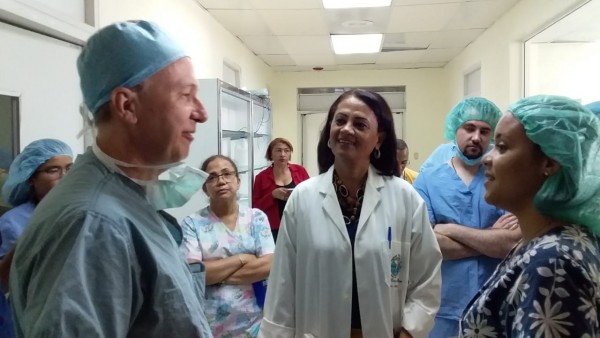
Juan Manuel Camacho, from Sabana Yegua (Dominican Republic) sends us this news:
"From January 6 to 13 we had the traditional visit of the group of parishioners of Saint Mary Catholic Church, in Kenosha (Wisconsin, USA), for the much-desired annual ophthalmological campaign. This time they were able to carry out 110 surgeries (cataracts and pterigium) at the local Taiwan hospital, and they checked the eyes of more than 900 people, providing all those who needed them with glasses. During the week in which the ophthalmologists visit us, the facilities of the parish become a medical field where people are checked and prepared for surgeries.
This campaign is an excellent opportunity for Dominican volunteers from the local community and the volunteers from the United States to share experiences, work and camaraderie, strengthening ties of friendship. From here, we want to thank the dedication of all the volunteers that make it possible for this annual campaign to be so fruitful. 2019 was the fourteenth consecutive year in which we have been able to do it. Thank you, dear friends from Kenosha!»
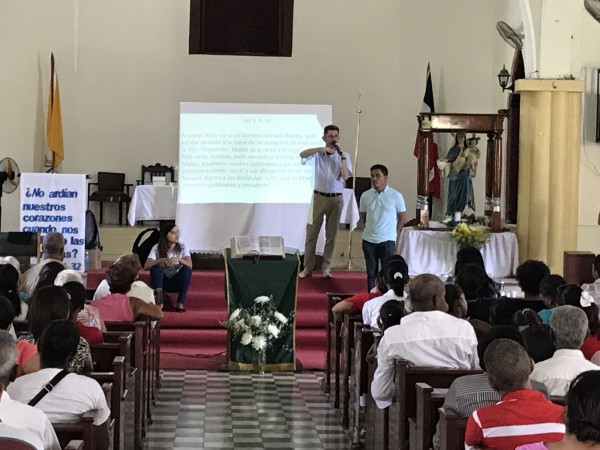
In preparation for the 525th anniversary (in 2019) of the first Eucharist celebrated in the New World, the Dominican Episcopal Conference declared 2018 as the Year of the Eucharist. In this context, celebrating the month of September as the month of the Bible, took place the Second Biblical Congress of the Diocese of San Juan de la Maguana. The congress was held on Saturday, September 1, at the Nuestra Señora de los Remedios parish, in Azua.
The event was organized by Fr. Juan Manuel Camacho, a member of the Community of Saint Paul, who is responsible for the Diocesan Biblical Commission, and the theme was "WORD AND EUCHARIST." The conference of the congress was delivered by Fr. Martí Colom, also of our community.
Martí shared with the attendees some reflections on various biblical passages related to the Eucharist, starting with the accounts of the Last Supper and then expanding the focus to "the other Eucharists", that is, other “eucharistic moments” related by the Gospels. We saw how these other moments can enrich our understanding of the Eucharist, as each one of them underlines an aspect of the Eucharist. For example, the joy that should be present in all our celebrations (as it is present at the Wedding in Cana), or the radically inclusive fraternity which we see in the meals of Jesus at the house of tax collectors, or the gift of full and responsible freedom that Jesus gives us –if we are willing to receive it– that underlies the Johannine text of the multiplication of the loaves and the fishes.
His presentation was very well received by the more than 200 participants of the Congress, who came from different parishes of the region. They returned to their communities with the desire to continue deepening in the scriptures and in what they teach us about the Eucharist.



.jpg)
